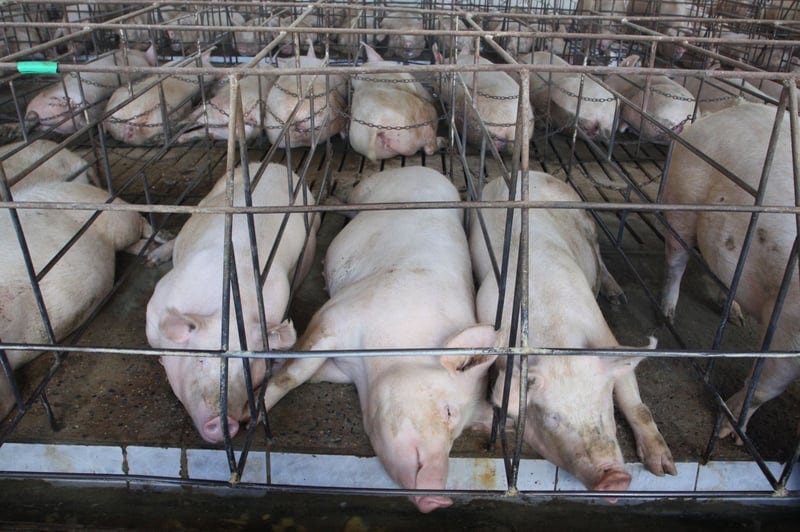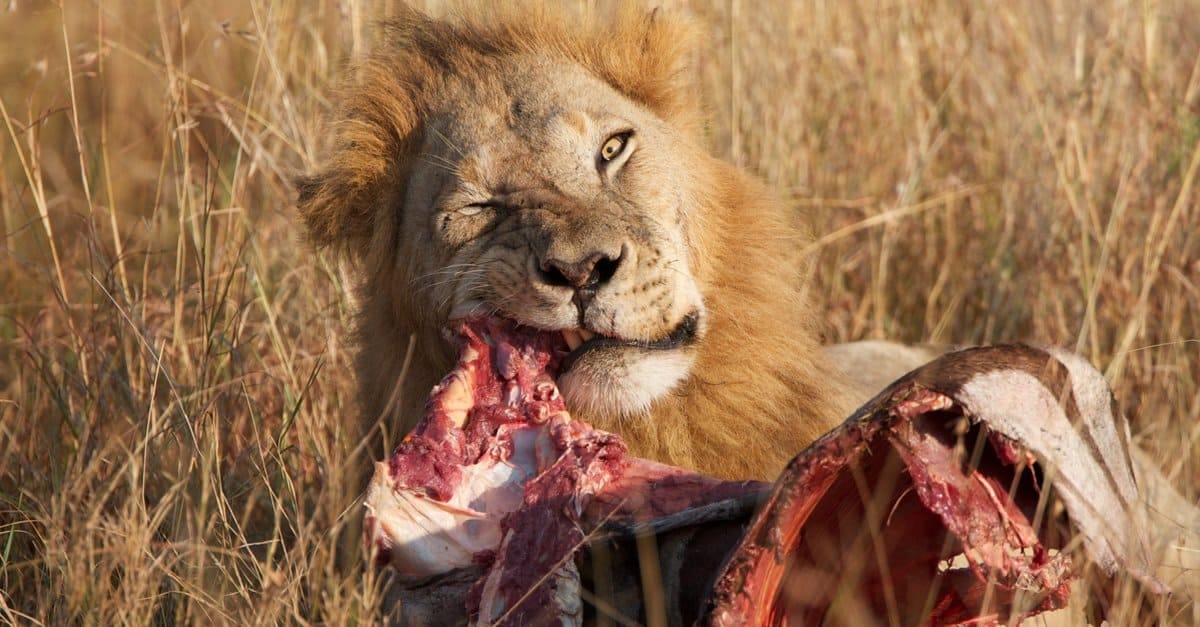Written by Noah Carl.
I’m not one to use overly emotive language, but the way we produce the vast majority of meat we consume – that is, through factory farming – is utterly barbaric. It involves unspeakable cruelty. Calling it the worst crime in history is no exaggeration. Each year, billions of sentient creatures are brought into existence and then tortured for weeks on end. Many live in a state of extreme and almost constant suffering. Only once they’re put to slaughter does the suffering finally stop.
If you heard about someone treating their dog or cat the way factory-farmed animals are treated, you’d think they were a psychopath. You might assume they were mentally ill. Yet anyone who eats factory-farmed meat is complicit in exactly this kind of treatment of animals. There are no morally relevant differences between the animals we keep as pets and the ones we raise for meat.
Absurdly, most Western countries have strict laws concerning how pets must be treated. In Britain, people are frequently put in prison for abusing or neglecting their pets. Yet it is perfectly legal to treat factory-farmed animals the same way or worse. This would be equivalent to a society where people with brown hair received all the protections of the law but people with blonde hair could be tortured with impunity. Anyone who’s against the mistreatment of dogs and cats (i.e., anyone who’s not a psychopath) ought to be against the mistreatment of cows, pigs and chickens too.
We Westerners pat ourselves on the back for how far we’ve come in terms of the treatment of animals, reflecting on the backwardness of our ancestors who practiced heinous blood sports like dog fighting and bear baiting. Yet we’re oblivious to the fact that most people today support a method of farming that is even crueler than blood sports, and which exists on a far larger scale.

In an article published last year, Richard Hanania drew attention to the horrors of factory farming while admitting that he is nonetheless “not a vegan”. His main reason for continuing to consume a diet “filled with meat” is that the alternative would not allow him to stay reasonably lean while also avoiding excessive hunger.1
As to how he reconciles his carnivory with the abject cruelty of factory farming, Hanania says: “I just grant to the vegan that he has won the argument, and he is morally superior from a utilitarian perspective”. Which doesn’t make a great deal of sense: if someone who frequently commits murder said, “I just grant to the non-murderer that he has won the argument, and he is morally superior from a utilitarian perspective”, most of us would be distinctly unmoved. Hanania does offer an additional defence of his inconsistency, namely that he is an enthusiastic supporter of lab grown meat.
But are veganism and unethical carnivory really the only two options? Hanania’s article seems to suggest they are – at least until lab grown meat becomes widely available. But this is a false dichotomy. There’s also the option of ethical carnivory. You can source produce from farms that treat animals humanely.
Raising animals for meat without torturing them isn’t exactly rocket science. In fact, it’s quite simple. As the Food Animal Concerns Trust explains:
Animals deserve adequate space, access to the outdoors, clean water and air, the opportunity to express their natural behaviors, and healthful feed … Animals should receive antibiotics only for treatment of disease or illness, as prescribed by a veterinarian. Antibiotics, hormones, or other substances should not be used to promote faster animal growth. All animals should be fed a natural diet free of animal by-products and have continuous access to clean and well-ventilated housing or shelter.
The downside of “humane farming” isn’t that it’s technically difficult. It’s that it’s much more expensive than factory farming – on the order of two to four times, depending on the species. While this is obviously regrettable, the big benefit is you don’t have to be someone who condones the torture of animals. And the monetary differential isn’t even that large. People are already used to paying two to four times more for food when they dine out.
Some on the right are reluctant to accept the inhumanity of factory farming (a point well made by Hanania in his article). They insist that man has dominion over “every creeping thing”. Or they assume that opposing factory farming is something only an unkempt, sandal-wearing hippie would do. But neither of these arguments holds up.
Even if humans do in some sense have dominion over animals, that doesn’t mean we’re entitled to torture them in vast dystopian edifices that are as far removed from the natural order of things as any communist dictatorship. Humane farming is plainly more “trad” than intensive animal rearing.2 Indeed, the staunchly traditionalist Pope Benedict XVI said of animals, “We cannot just do whatever we want with them … this degrading of living creatures to a commodity seems to me in fact to contradict the relationship of mutuality that comes across in the Bible”.
And who says you have to disagree with the left on everything? After all, there’s a compelling conservative case against factory farming. A vocal cohort of right-wing activists have begun criticising various aspects of modern food production. One such individual is Twitter user Raw Egg Nationalist – whose tweets denouncing factory farming as an “abomination” regularly go viral, racking up thousands of likes.

Of course, ethical carnivory isn’t only vulnerable to attack from the right. Many on the left will dispute that such a thing exists. They’ll insist that carnivory can never be ethical because, at the end of the day, you’re still killing sentient creatures. But this argument doesn’t hold water.
To begin with, we already do a number of things that take the lives of sentient creatures. We implement pest control to exterminate rats and mice. We build wind turbines that knock birds out the sky. We whizz about in vehicles that mow down foxes, badgers and hedgehogs. According to the Mammal Society, around 300,000 mammals are killed or seriously injured on British roads each year. And note that most of these casualties are preventable: if we cut the speed limit to 10mph, the number would be close to zero. But we don’t, for the sake of convenience.
Even plant-based agriculture robs sentient creatures of their lives. As the scientist Mike Archer notes, large numbers of voles, mice, rats, snakes and lizards are ground up in the process of harvesting crops. (This is on top of pest control in grain storage facilities.) Since livestock often subsist on grains, many such deaths also occur when animals like cows and pigs are raised for meat. But the point isn’t that a greater total of sentient creatures are killed in plant-based agriculture.3 It’s that most vegetarians and vegans are complicit in the killing of some animals. Hence they can’t object to humane farming on the basis that any killing of animals is wrong.
Moreover, there’s a strong case to be made that killing animals, assuming it is done painlessly, isn’t morally wrong.4 You have to distinguish between killing on the one hand and torture on the other – between taking an animal’s life and causing it prolonged suffering. The latter is wrong, which is what makes factory farming impermissible.
Now, humans can be killed painlessly but murder is still wrong. So why is it permissible to kill animals? The main reason is that animals do not plan very far ahead, so unlike humans they cannot have their plans for the future dashed.5 They don’t have a strong desire to continue existing. A second, related reason is that animals have a very limited ability to learn and communicate about evolutionarily novel stimuli, which means that killing some members of their species doesn’t provoke panic among the rest. In human society, the knowledge that people were being given the proverbial bullet in the back of the head would lead others to live in a state of constant fear that they could be next.
A final argument in defence of animal farming is that humans are specifically adapted for an omnivorous diet rich in animal protein, and it cannot be unethical to eat the diet for which we are adapted. For example, it is clearly not “unreasonable” for lions to kill and eat their prey since they must consume large quantities of meat to survive.
This is undoubtedly the weakest and most contentious of the arguments in defence of animal farming. (Fortunately, isn’t actually necessary.) The obvious objection is that it is possible for humans to survive and thrive on a purely vegetarian diet.6 In response, I would say that while most people may be able to thrive on such a diet, there are individual differences in digestion/metabolism and some people are probably much better off on a diet that includes meat. There could also be critical windows during development in which consumption of animal protein is important. Nathan Cofnas argues vegetarian diets may not be safe for children, for example.

At this point, I should admit that I can’t exactly claim the moral high ground myself. Although I don’t eat meat every day, and I do make an effort to obtain it from ethical sources, I’m not always a hundred percent scrupulous. From time to time, I consume meat that may not have been reared to high standards of welfare. One excuse is that it’s often difficult to actually find the right meat even though I’m willing to pay. Of course, if factory farming were banned, as it obviously should be, this problem would not arise. You could walk into any dining establishment safe in the assumption that choosing a meat option would not render you complicit in animal torture.
Factory farming is morally unconscionable and should be banned immediately. However, this doesn’t mean we have to give up eating animal protein until cultured meat eventually hits the shelves. There’s no reason why right-wingers have to support factory farming – a monstrous practice that’s entirely divorced from traditional husbandry. And the left-wing case against all forms of animal rearing isn’t persuasive. So enjoy your next hamburger, but make sure the cow it came from wasn’t tortured.
Noah Carl is Editor at Aporia.
Become a free or paid subscriber:
You can also follow us on Twitter.
I don’t buy this argument. You can certainly get adequate protein on a vegan diet while “hitting your macros”. You just have to combine protein-rich foods like seitan and pea protein powder with voluminous foods like salad and roasted vegetables.
As the writer Matthew Scully observes, “Conservatives are supposed to revere tradition. Factory farming has no traditions, no rules, no codes of honor, no little decencies to spare for a fellow creature. The whole thing is an abandonment of rural values and a betrayal of honorable animal husbandry”.
There are some other caveats, such as that the animal should not be frightened beforehand (for example, by witnessing other members of its flock or herd being slaughtered), should not be too young (or else the killing will cause distress to the mother) and should not have been mistreated during its life.
Even animals that store food for the winter appear to do so instinctually. Chimpanzees and corvids may be exceptions, but not no one is suggesting they should be raised for meat.
Whether they can thrive on a purely vegan diet is much less clear.




excellent post & mirrors my views/practices. an additional argument for humane husbandry is: if you think their lives have positive value (i.e. their existence is ceteris paribus good) then humane husbandry allows for the existence of more animals than would otherwise exist. they would not exist without the demand for them & the demand comes from their meat. this implies that eating the meat of animals raised well is not neutral, it is good. it will cause more of them to exist & live flourishing lives in their context.
Good article. Although I do still struggle with it emotionally as an animal lover, I only eat wild game I hunted my self. Wrote a piece on it: https://open.substack.com/pub/brandonmcmurtrie/p/is-hunting-wrong?r=1kxn90&utm_medium=ios